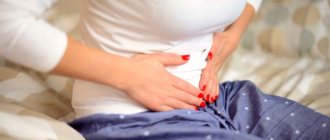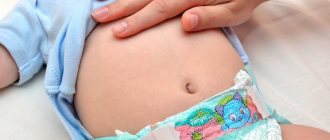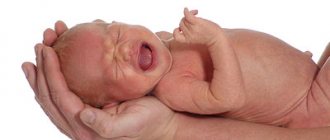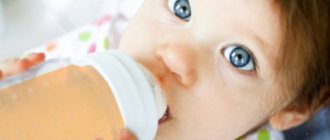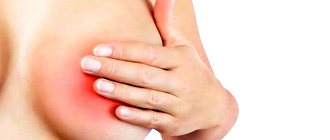One of the most common problems that arise in the first year of life is flatulence in infants, which causes a lot of discomfort to the child. This disease causes whims and restless sleep of the baby. Parents, in turn, also suffer due to the constant tantrums of the baby. To get rid of bloating in newborns, it is necessary to understand the causes of the disease and eliminate them.
Bloating brings a lot of discomfort to a child. And the mother has only one desire - to find out how to get rid of gases in the baby’s intestines.
Flatulence in newborns limits parents in choosing a remedy for colic or a medicine for bloating. But there are still simple ways to help your child even without drops and other medications:
- A nursing mother should remember which foods cause gas and refrain from eating them. At the same time, it is desirable to provide the richest possible diet.
- Continue breastfeeding for as long as possible, but make sure your baby is latching on to the nipple correctly. When feeding formula, it is important to buy anatomically shaped bottles.
- To prevent bloating in a newborn when introducing complementary foods, it is important to strictly follow the rules of this procedure. But even in this case, bloating is possible as a first reaction to foods that are new to the baby, even those that do not cause gas formation.
- The best remedies for flatulence for newborns are a light abdominal massage, gymnastics and dill water. In most cases, they easily replace drops and pharmaceutical medications. But such treatment or the choice of pharmaceutical drugs for colic should always be under the supervision of a doctor.
Laying on the stomach and a warm diaper are additional means that naturally help the passage of gases, reducing flatulence in the newborn. And the vertical position of children after breastfeeding will allow the air swallowed during feeding to escape through belching.
The best remedies for flatulence
If diet correction does not help cope with the problem, then you need to consult a specialist. The attending physician will select the optimal drug for bloating. The medicine must effectively combat flatulence and be absolutely safe. In pharmacies you can find a wide range of anti-bloating medications that are approved for breastfeeding.
Treatment of flatulence in a nursing woman should be carried out under the supervision of a specialist. Anti-dysbacteriosis medications are prescribed only after a full examination.
Newborn's reactions to bloating
Typically, the swelling of the tummy occurs in the evening. Some time after feeding, the baby begins to worry and scream. Trying to get rid of the bloating, he twists his legs, pulls them towards his stomach and turns red from unsuccessful attempts. The abdomen rounds and increases in size. It feels hard to the touch.
Attacks of intestinal colic are measured in minutes and even hours. Relief occurs after emptying or releasing gas. The baby's torment is unbearable, so parents should do everything possible to quickly eliminate the discomfort.
In case of flatulence in a newborn, pediatrician Komarovsky recommends installing a gas outlet tube. The child is placed on his left side or back, the anal area is lubricated with Vaseline and the device is slowly inserted no more than 5 cm. The gas will soon come out.
Folk remedies
The best non-traditional remedy for flatulence is the use of fennel decoction. The plant is rich in beneficial essential oils that effectively combat flatulence. Fennel has an excellent carminative effect, accelerating the passage of gases through the intestines.
To prepare the decoction, take 2-3 tablespoons of fennel fruits. These are dry plant seeds that are sold in pharmacies. The fruits are poured with boiling water. 1 glass is enough. The mixture is heated over low heat for 20 minutes. After this, the resulting broth is filtered and diluted with boiled water.
The prepared decoction is consumed orally. If you have severe bloating, you can drink ½ glass at a time three times a day. It's better to do this before eating. When the pronounced symptoms of flatulence pass, the dose can be reduced to three tablespoons at a time.
Bloating is an unpleasant symptom, often accompanied by pain. Safe medications prescribed by a doctor will help cure flatulence in a nursing mother. A special diet will help consolidate the positive effect.
Increased gas formation after childbirth worries every third new mother. Its causes are physiological processes that do not require treatment, or pathologies that require mandatory correction. You can try to find out on your own why bloating occurs in the postpartum period, but it is better to consult a doctor.
The reasons for intestinal bloating are often hidden in poor nutrition. After the birth of a child, a woman tries to eat healthy food, but does not always choose the right foods. Flatulence can be increased by:
- yeast products, black and white bread, baked goods;
- dairy products, ice cream;
- cabbage, potatoes, radishes, radishes and all legumes;
- most cereals;
- carbonated drinks, sweets.
If these dishes predominate in a woman’s diet, then to eliminate increased flatulence it is enough to simply change the diet. It is necessary to give preference to protein dishes, replace raw vegetables with heat-treated ones, and exclude all gas-forming foods. Instead of dairy products, you should consume fermented milk products.
Gases in the intestines are formed due to the fact that during pregnancy the fetus compresses the digestive tract, and immediately after childbirth it relaxes. The loops cannot immediately take their usual position, which is why food stagnates, constipation and flatulence occur. Moderate physical activity and taking laxatives that do not affect intestinal motility will help eliminate this problem.
Pathology
Signs of flatulence after childbirth increase with gastrointestinal diseases. Additionally, a woman may experience abdominal pain, heartburn, nausea, indigestion, unpleasant belching, or other discomfort. Such symptoms may indicate pathologies:
Treatment is selected according to the type of disease. It is imperative to take into account whether the woman is breastfeeding, since many drugs are prohibited in this case. It is unacceptable to self-medicate, because improper use of medications can aggravate the condition of a woman whose body is already weakened after childbirth.
Caesarean section and gas formation
A separate group includes women who developed severe flatulence after surgery. Often the complaint of increased gas formation is associated with the fact that the child is born by caesarean section. This procedure requires the use of drugs that temporarily shut down the digestive tract. Recovery does not occur immediately, and decreased peristalsis leads to temporary constipation and gas formation.
Symptoms of flatulence after a cesarean section disappear within a few weeks. If the abdominal pain continues to bother you or the incision is healing poorly, then you should definitely contact a gynecologist with these complaints.
special instructions
Espumisan is contraindicated in the following cases:
- Intolerance to simethicone.
- Allergy to excipients.
- Intestinal obstruction.
- Diseases of the digestive tract that are accompanied by obstruction.
The drug is well tolerated by patients. Negative reactions occur only with hypersensitivity to the main or additional substances. Then the likelihood of allergies (rash, itching, redness) increases. If the patient notices such signs, it is necessary to stop taking the medication and consult a doctor.
Patients under 6 years of age take Espumisan in syrup form. The medication does not contain sugar, so it can be taken by diabetics and for digestive disorders. An allergic reaction is provoked by the dyes that are part of the drug (capsule).
Espumisan does not disrupt the activity of the nervous system, so it can be taken by patients whose activities are related to concentration and reaction speed. The carminative does not react chemically with other drugs and ethyl alcohol.
An overdose of the drug is impossible due to the peculiarities of its chemical structure; in addition, Espumisan is physiologically inert. During lactation and pregnancy, the drug is not contraindicated.
Symptomatic treatment
Most new mothers do not have enough time to visit doctors, so they try to get rid of a delicate problem on their own. You should start with your diet. It is also necessary to ensure that bowel movements are regular.
As symptomatic emergency medications, it is permissible to use the following drugs: Espumisan, Sab Simplex, children's Bobotik or dill water.
Such products are allowed during breastfeeding; they will also have a beneficial effect on the functioning of the baby’s digestive system. Anti-flatulence medications will break up the accumulations of gases and gently remove them naturally.
Experts note that the birth of a baby can sometimes provoke unpleasant changes in the mother’s body, such as increased gas production after childbirth. Often this disease is accompanied by bloating, rumbling and seething in the stomach. Sometimes stomach cramps and other eating disorders are possible. All this affects the already changed routine of life. What is the reason? What will help to cope with this phenomenon without harming the child and when is a doctor’s help needed?
The condition of the stomach is inextricably linked with nutrition. If a woman eats irregularly and in large portions, intestinal problems cannot be avoided.
The choice of products itself is also important. Some foods can cause flatulence during the postpartum period:
- Brown bread and other yeast-based flour products, fresh milk and ice cream have these properties.
- Vegetables at risk include potatoes, cabbage, radishes, turnips, onions and all legumes.
- Fruits that cause flatulence include pears and grapes.
- Mushrooms, cereals with the exception of rice and sparkling water close the list.
If any of this is regularly or in large quantities present in the diet of a nursing mother, increased gas formation can be expected.
Other causes of flatulence are associated with physiological changes in the mother's body.
Before birth, the grown fetus actively puts pressure on the organs, squeezing them or moving them to the side. Therefore, within several months after the birth of the child, it is necessary to restore the entire body to a normal state.
In some cases, bloating may indicate serious health problems, such as dysbiosis. We need to consider what a young mother can do at home.
Having determined the causes of this disease, you need to understand what to do to eliminate them. Firstly, it is worth reviewing your diet. It is necessary to minimize or eliminate the consumption of foods that increase flatulence.
They can be replaced with something that, on the contrary, will alleviate your condition:
- Instead of milk, you can eat fermented milk products with almost no restrictions.
- The main products in the diet will be lean meat and fish.
- Citrus fruits will help you in moderation (you shouldn’t get carried away with them, as they can provoke allergies in either mother or baby).
- Pumpkin porridge, rice, sweet peppers, muesli, and tea with fennel seeds prevent increased gas production.
Even though breastfeeding takes up most of your time and energy when caring for your newborn, it is still worth making an effort to take care of yourself. You need to eat small portions 5-6 times a day. With the permission of the attending physician, it is necessary to take walks and exercise. This way, it will be easier for the body to recover after childbirth.
If the mother has made every attempt to change her lifestyle and diet, but the problem remains, you should consult your doctor. This could be a therapist or gastroenterologist. If bloating persists, it may indicate a more serious digestive problem. Before starting treatment, a specialist may prescribe an ultrasound or other type of diagnostic to most accurately determine the cause of this phenomenon.
If a caesarean section was used during childbirth, this circumstance can also lead to increased flatulence, since during this operation drugs are introduced into the body that temporarily block the activity of the digestive system. In this case, the doctor will recommend one of the types of moderate physical activity to quickly restore organ function.
In case of dysbiosis or active activity of harmful microorganisms in the intestines, drug treatment is necessary.
Depending on the individual characteristics of the body, the following drugs may be prescribed:
- The drug Linex is aimed at enhancing the improvement of intestinal microflora. Since this product is based on herbal ingredients, it is safe for women who have recently given birth to children.
- Espumisan allows you to stop the production and painless removal of excess gases. This is facilitated by simethicone, the main active ingredient of the drug.
- The action of Hilak-Forte is aimed at reducing gas pressure on the intestinal walls, which reduces spasms caused by flatulence. The drug is also aimed at restoring microflora, so it can not only eliminate pain, but also heal.
Remember that the use of any medications is possible only after they have been prescribed by a doctor, so as not to cause harm to the baby’s delicate body during feeding.
Flatulence can occur in a woman after the birth of a child for various reasons: due to cesarean section, poor nutrition or dysfunction of the gastrointestinal tract.
To restore stomach function, a young mother needs to reconsider her diet and meal times, and engage in physical exercise.
If the situation is serious, you need to contact a specialist so that he can diagnose and prescribe treatment.
The joy of motherhood is not the only thing a young mother may face after giving birth. Thus, a woman often faces a very delicate problem that is kept silent about - gases and fecal incontinence after childbirth
. As a rule, a young mother, faced with similar problems - frequent flatulence and gases with minor feces - simply does not talk about her embarrassment, considering it indecent.
But experts talk about the forced and timely need to consult a doctor, since incontinence after childbirth is a very common complication that can be quickly and easily treated. A young mother should be wary of frequent intestinal bloating, characteristic pain syndrome and farting with feces. In most cases, this is associated with improper nutrition of the nursing mother, and fecal incontinence is explained by weakening of the sphincter muscles, which is a fairly common phenomenon after pregnancy. But women simply close themselves off with their problems alone, exclude any visits to friends and relatives, and refuse intimacy with their husbands. The problem with gases and feces can be solved, which is described in detail in the article.
Flatulence and stool incontinence after childbirth can develop due to the following reasons:
- Improper nutrition of the mother - for example, a woman constantly wants to consume whole milk or kefir. These are exactly the foods that are beneficial for the baby and the production of breast milk, but provoke bloating in a woman. Therefore, it is important to exclude such products from the menu.
- Flatulence is a consequence of a combination of incompatible products - for example, proteins and starch, when combined, provoke bloating. Therefore, after giving birth, you should not eat meat with potatoes or pasta - here it is better to use the nutritional rules (grains and proteins are separately combined with vegetables).
- Overeating is also a cause of bloating. After childbirth, a young mother is recommended to eat fractional meals - up to 5-7 times a day, but in small portions.
- Eating fruit after the main course is always prohibited, since fermentation begins in the intestines, causing bloating to take on harmless turns.
Intestinal bloating in a woman in labor is a completely understandable phenomenon due to the displacement of internal organs during pregnancy. Immediately after childbirth - within a month - flatulence may appear. But farting here happens without excreting feces - otherwise, it is considered a pathology that requires timely treatment at the initial stage.
Espumisan and nutritional rules for flatulence in lactating women
If a nursing mother has problems with the digestive tract, then first of all she needs to adjust her diet. To do this, you need to exclude from the menu foods that increase fermentation in the intestines. They are the ones who provoke excess gas formation and bloating.
Foods that cause flatulence:
- peas;
- beans;
- beans;
- radish;
- cabbage;
- grape;
- yeast products.
In addition, lactating women should avoid full-fat milk and dishes based on it. This is explained by the fact that they contain milk sugar (lactose). If there is a deficiency or absence of enzymes in the body of a nursing mother that are responsible for the breakdown of lactose, then the likelihood of flatulence increases.
If you are breastfeeding, you should avoid carbonated drinks. They are the ones that cause bloating. The above-described products are prohibited from being consumed, as they can cause flatulence not only in the mother, but also in the baby. For this reason, lactating women need to monitor their diet.
It is acceptable to eat lean meat (veal, turkey, etc.) during breastfeeding. If the baby does not have allergies, then it is allowed to eat white fish. It is recommended to consume almost all vegetables (except legumes) and cereals. If bloating occurs due to a violation of the natural bacterial flora, then fermented milk products with a low percentage of fat content should be included in the daily menu.
It is recommended to eat small portions and not overeat. If a woman has adjusted her diet, but the problem does not disappear, then she can take special medications. Espumisan when feeding is an effective and safe remedy that helps eliminate flatulence and improve digestion.
The drug is safe for children, as it is used to reduce the manifestations of colic in patients after birth. For this reason, you should not stop breastfeeding while taking the medicine. The decision on the dosage of a carminative is made by the doctor after making a diagnosis.
Thus, Espumisan is absolutely safe for mothers during breastfeeding (if there are no contraindications). In this case, the patient must follow the recommendations of doctors regarding the use of the drug.
Often new mothers complain that a lot of different changes occur in their body after the birth of the baby. One of the common ones is increased gas formation in the intestines.
The violation, of course, is not particularly pleasant. Therefore, not all representatives of the fair sex run to the doctor for help. They prefer to fix the problem themselves. So, let's look in detail at what causes the problem and how can you get rid of it?
Often the cause of increased gas formation is the diet of the new mother. So to fix the problem, the first thing you need to do is review your daily menu.
It should not contain products that contribute to the formation of excessive gases. Among such products are white cabbage, milk, black bread, and legumes. In addition to them, a combination of certain foods can also cause increased gas formation. These are products that contain starch and protein.
This means that you should not add meat when eating pasta or potatoes. It is recommended to eat meat with vegetables. It is recommended for women to eat broccoli after childbirth.
The food should be gentle. You should include juices, cereals, still water, soups, and broths in your menu. These products will be especially useful in the first days after the baby is born. Over time, you can add the following products to the menu - eggs, crackers, boiled carrots, apples (first baked and then fresh), thermally treated beets, boiled (lean) meat, vegetables, biscuits.
Young mothers should remember that in order for the digestive organs to function normally, they need to drink a lot of fluid, especially in the hot season. Often women do not follow this recommendation, despite its simplicity.
Exotic foods after childbirth should be eaten in minimal quantities. Simple food will be easier to digest in the intestines. It is important to provide frequent meals, but the portions should not be large.
Sometimes it happens that a woman experiences increased gas formation due to the fact that after the birth of the baby, some of her internal organs get mixed up.
The uterus, which increases in size, begins to actively displace the intestines and pelvic organs in the last three months of gestation. It takes them some time to return to their previous position.
At this time, a collection of digestive system activities may occur. In this case, in order for the functioning of the internal organs to be restored, you need to do a certain set of exercises.
In addition, flatulence can occur in the presence of the following disorders:
If there is even the slightest suspicion of the presence of the conditions indicated above, then the woman should consult a doctor as soon as possible. You need to make an appointment with a gastroenterologist.
Possible diseases
Incontinence is often a consequence of some serious illness. Yes, in the first 1-2 months there may be a corresponding urge to go to the toilet after each fart, but it should not come to the point of passing feces. The presented phenomenon is a consequence of loss of sphincter muscle tone, which will strengthen over time and the problems will go away on their own.
You should pay attention to the problem when, during incontinence, your stomach hurts significantly - it’s not just a twisting sensation, but a completely normal intestinal pain syndrome is felt. If you have such signs, you should consult a doctor, because the following diseases can cause trouble:
This is important: Involuntary incontinence can also become a sign of a dangerous pathology - when the sphincter muscles atrophy completely. In this case, only surgery will help. If not treated promptly, rectal prolapse may occur.
Flatulence after cesarean section
If a woman has had a caesarean section, bloating is not a sudden occurrence. Everything here is explained by the harmful effects of the operation on the intestines of the woman in labor. This occurs due to the administration of drugs for pain relief - especially when using epidural anesthesia (injecting a drug into the bone marrow of the spine). True, after a cesarean section there are rarely problems with fecal incontinence - this is also a consequence of the absence of overstrain of the sphincter muscles, which occurs during natural childbirth.
Often the cause of flatulence after childbirth by cesarean section is formed adhesions. To avoid such complications, it is important to get out of bed immediately after anesthesia and begin physical activity. Of course, you don’t need to start doing physical exercises - just walking around the room is enough. The more a woman moves after a cesarean section, the fewer problems with incontinence and bowel movements she will experience in the future.
Causes
Bloating after childbirth can be caused by various factors:
- Exacerbation of gastrointestinal diseases.
- Poor nutrition.
- Rehabilitation period after cesarean section.
- Dysbacteriosis.
- Irritable bowel syndrome (IBS).
- Food allergies.
Persistent, constant or frequently recurring flatulence should cause concern, especially if even nutritional correction does not help to cope with it.
The situation can be aggravated by stress, low physical activity, and eating unhealthy foods that cause increased gas formation. Occasional bloating that does not cause significant discomfort is not considered dangerous.
When to see a doctor
Increased gas formation after childbirth may not bother a woman, but only if we are talking about the manifestation of incontinence and flatulence only in the first 2 months. Otherwise, the young mother should start sounding the alarm and consult a doctor immediately. Moreover, if in the first time after the birth of a child a woman is bothered by abdominal pain, nausea, vomiting, fever and other symptoms, she should not wait until the end of the conditional period - she should immediately consult a doctor. The presented symptoms can become a manifestation of an intestinal infection, the development of an inflammatory process, which cannot be started - timely treatment will prevent most complications. It should also be noted that maternal diseases also affect the mother’s health - intestinal infections easily enter the child’s body through breast milk. This entails dangerous consequences, ending tragically in advanced cases.
This is important: Incontinence or gas formation should never be treated on your own with medications. Most of these drugs are contraindicated for use during lactation. This is explained by the release of toxic substances that enter the woman’s blood and the baby’s body through breast milk.
Uncomfortable urination
You have to be patient, everything will definitely come back to normal
After surgical delivery, problems with urination often occur. The first bowel movement after surgery causes particular difficulties. But you need to “go to the boat” on the first day: otherwise the bladder will be full, which will provoke severe pain. The woman in labor will relieve herself more often - the muscles of the urinary tract will recover faster. When the patient cannot empty herself, she is given a catheter through which the fluid is removed.
After the first urination, the process usually improves, but most women complain of pain/burning that accompanies emptying the bladder. This is considered quite natural during the first weeks after surgery. However, if discomfort does not disappear after seven days, you should consult your doctor. Only a specialist can tell if everything is okay. If a little time has passed after the operation, and there are no obvious causes of pain, then the doctor may choose a wait-and-see approach. Discomfort should go away no later than three weeks. If the pain remains, it means something is wrong with the body.
Pain during bowel movements may disappear and then return again. “Return” usually indicates an infection or disease of the urinary system. You should not delay your visit to the doctor if:
- every trip to the toilet is accompanied by discomfort;
- the temperature stays above 37 degrees for three days or more;
- Uncharacteristic discharge is observed.
Self-medication using medications in the postoperative period is unacceptable. Especially if a woman is breastfeeding her baby. Traditional medicine methods are used strictly after approval by a doctor, otherwise you can cause irreparable harm to your health. The selection of suitable therapeutic methods is preceded by a thorough diagnosis.
How to get rid of the problem
Incontinence and flatulence after pregnancy can be eliminated in several ways.
Diet and proper nutrition
First of all, they begin to review nutrition in the postpartum period. During the first few months, the mother's diet should be as gentle as possible - it is necessary to consume soups and still water. After a month, they begin to introduce potatoes, meat, fish into the diet - protein foods are steamed or simply boiled. Subsequently, vegetables and crackers are introduced into the diet. It is recommended to avoid fruits if you have incontinence or flatulence. It is better to use fruit or permitted berry compotes to saturate your body with vitamins and other useful microelements. Vegetables also exclude types that cause flatulence - cabbage, cucumbers, and any root vegetables.
Treatment with folk remedies
Flatulence and incontinence can be cured with folk remedies - this refers to various compositions and infusions that normalize intestinal function and hold feces together. The most effective include dill water and chamomile infusion. Dill water has a beneficial effect in the treatment of intestinal flatulence not only in women, but also in children. Pediatricians often advise the mother to drink dill water an hour before feeding the baby. For preparation, use dill seeds, which in the amount of a tablespoon are poured with two glasses of boiling water. The infusion is left to infuse for 3 hours. Then take half a glass, but always before meals.
Chamomile infusion is prepared in a similar way - pour a tablespoon of dried flowers into a glass of boiling water and leave for an hour. The resulting infusion is drunk 50 ml throughout the day - you need to drink the entire glass per day.
This is important: The use of folk remedies in the treatment of flatulence and fecal incontinence begins only after consultation with a doctor. This is necessary to avoid the development of allergic reactions in the baby, as well as complications in the mother.
Dosage of the drug
The method of using the carminative is oral. It is taken during or after a meal. It is recommended to take the medicine at night.
The daily dose of the drug depends on symptoms and age:
- For flatulence and heaviness in the abdomen, patients over 6 years of age take 40 or 80 ml of syrup or 1 to 2 capsules 3 to 5 times.
- When preparing for an ultrasound or x-ray of the abdominal organs, the drug is taken one day before the examination - 20 - 40 ml of syrup or 2 capsules three times.
- To obtain a double contrast image, add 20–40 ml of emulsion to 1 liter of contrast suspension.
- To eliminate the symptoms of intoxication caused by toxic substances, adults take 50 - 100 ml of syrup, and children - from 10 to 50 ml.
If a newborn has excessive gas formation, syrup is prescribed, which is mixed with milk or filtered water. The medicine is given from a bottle or spoon during or after meals. The dose of the drug during breastfeeding and pregnancy is determined by the doctor.
Treatment of the problem
Fecal incontinence can only be treated by performing gymnastics to strengthen the anal muscles. Often, precise and effective gymnastics in an individual case is prescribed by a doctor - a preliminary examination is carried out to identify muscles that have lost tone. In most cases, Kegel exercises are recommended - this is a complex designed to strengthen the pelvic muscles. Thanks to regular practice, you can get rid of problems with urinary and fecal incontinence, which is quite common after natural childbirth.
Incontinence and flatulence after childbirth are common, but not so dangerous, unless the cause of the presented troubles is the development of serious diseases of the internal organs. In the best case, you can get rid of the problem literally a month after giving birth. Sometimes you have to wait and undergo treatment during the first 3-4 months after birth. Provided that bloating and incontinence did not appear earlier, but arose only a few months after the birth of the child, they already speak of the presence of serious problems with the intestines - you cannot do without consulting a doctor.
Disorders of the gastrointestinal tract after childbirth are a common phenomenon in women. In the first months, young mothers often suffer from increased gas formation.
This is often associated with poor nutrition, because after the birth of a baby a woman has no time for herself at all, and there is simply no time to monitor her diet or eating habits.
In addition, during pregnancy the body is accustomed to working in a certain rhythm. When the extra load has disappeared, it has to rebuild itself again, which is what causes various digestive disorders.
Sometimes there are no problems with the intestines. But if a problem such as flatulence after childbirth does arise, then there is no other way out; first of all, it is important to improve your diet.
Pain syndrome
The recovery period after a CS is accompanied by various types of pain. Patients complain of pain:
- in back;
- in a stomach;
- in the area of the incision.
Back pain occurs during pregnancy. As the fetus grows, the spine has to cope with a huge load. This often leads to pinched nerves, especially in the last weeks. The problem remains after the CS. Acute lumbar pain usually appears during natural childbirth - as a result of muscle strain. But this problem is also familiar to women who have had an emergency cesarean section, that is, the surgical intervention occurred after the beginning of pushing.
Abdominal pain refers to the discomfort that occurs due to contractions of the uterus. Contractile activity is painful, and the unpleasant sensations are intensified due to the fresh scar located on the uterus. At first, the pain in the abdomen becomes even more noticeable when the baby is applied to the breast. From stimulation of the nipples, the uterus begins to actively contract. The discomfort must be endured: taking painkillers without a doctor’s prescription is strictly prohibited. Typically, a woman in labor is prescribed uterine oxytocic agents, which stimulate contractility and accelerate the process of the organ returning to its previous size.
Pain in the incision area is natural. The injured tissue reminds itself of itself with every movement. It becomes easier only after a week, but the stitch will remain visible for about a month, or even much longer. Sometimes the pain caused by the tissue incision radiates to the side, which is why the young mother cannot even determine what hurts.
Recovery after a caesarean section is a difficult and long process. But if you listen to the doctor and follow his recommendations, the discomfort will soon disappear and the woman will be able to enjoy motherhood. In addition, following medical recommendations is the key to the absence of postoperative complications.
Why do gases appear?
After a woman gives birth, the digestive organs are no longer squeezed by the uterus. It will take some time for the intestines to return to their normal position.
Basically, after a few months the problem of increased gas formation goes away on its own. However, how to survive this time? After all, gases can cause constant psychological stress, which is not at all beneficial for a new mother during breastfeeding. Due to strong worries and constant tension, milk may even disappear.
During lactation, a mother simply needs to adhere to the correct diet and not eat foods that cause even more bloating due to fermentation and the release of excess gases in the intestines.
What to do about flatulence
Of course, you should definitely visit a doctor. Only a doctor can help you plan your diet correctly and help avoid frequent bloating.
If the cause of flatulence is hidden in (an examination will help to find out), then the situation can be improved not only by diet, but also by the use of prebiotics. Such remedies will also be correctly prescribed by the doctor.
Traditional medicine can also help eliminate increased gas formation after childbirth in a nursing mother. But it is important to understand that some herbal components are contraindicated for women who are breastfeeding. Therefore, only the safest recipe will be offered.
About the diet
If we talk about the cause of gas formation, such as poor nutrition, then, first of all, you should know what foods need to be excluded from the diet.
- legumes;
- potato;
- radish and radish;
- grape;
- bananas;
- mushrooms;
- cabbage;
- flour products;
- milk;
- carbonated drinks;
- sweets (in large quantities).
Difficult-to-digest foods can also cause bloating if the amount of necessary enzymes for digestion is insufficient.
It is important for a nursing mother to understand that foods that cause increased gas formation affect the composition of breast milk. Thus, colic and gas also appear in her child.
What to do to reduce the likelihood of flatulence in mother and baby:
- eat food that is easily digestible;
- drink more fluids;
- eat at the same time;
- eat small portions, but often.
If you try to comply with these standards, you can easily make the problem less pronounced, and then completely eliminate it.
Drug therapy for breastfeeding women
Depending on the cause of gas formation in a woman who has recently given birth, different ones are selected.
Initially, the doctor will clearly determine whether dysbiosis is present or whether enzyme deficiency has become a prerequisite for the development of increased gas formation, and only then treatment will be prescribed.
It is not recommended to choose gas elimination products on your own. The problem cannot be solved if the medication is chosen incorrectly. In addition, some medications should not be used by breastfeeding women.
Activated carbon
This remedy is often used for food poisoning, as it is a natural sorbent. However, in case of dysbiosis, it can be prescribed to eliminate excess gases and for women after childbirth.
It should be taken to remove toxins that are produced by pathogenic intestinal microflora and contribute to the formation of flatulence.
This is only part of the therapeutic measure and symptom management. To eliminate the root cause of the problem, normalization of the microflora and taking additional medications will be required.
The general instructions say that you should take 1 tablet per 10 kg of body weight. But all prescriptions for lactation can only be made by the attending doctor.
This product is also a sorbent. The active substance of the drug is not absorbed into the blood, due to which women are allowed to use the medicine while breastfeeding.
The medication helps remove toxins and gases through absorption.
After treatment with Smecta, the use of probiotics or prebiotics is indicated.
Linex
This drug is a probiotic. For dysbiosis, this is simply an irreplaceable remedy that helps create optimal conditions in the intestines for the life of beneficial bacteria.
With normal microflora, gas formation is reduced, and the digestive excretory organ begins to function normally.
You need to drink 3-4 capsules per day. Linex Forte – 1 capsule per day is enough.
Hilak Forte
This product is available in drops and is a prebiotic, that is, it contains living beneficial bacteria.
If a girl who has recently given birth suffers from microflora disorders, flatulence or constipation, then she may be prescribed this medicine. It does not harm the baby through breast milk.
Apply it three times a day, 50 drops, diluted in a small amount of water.
The duration of the course is determined by the doctor, depending on the individual situation of the patient.
Sub Simplex
The medicine is available in the form of drops. Suitable for treating gas not only in nursing women, but also in newborn children.
Simethicone, which is included in the drops, helps destroy gases inside the intestines, or naturally quickly removes them out.
The drug should be taken 30-50 drops every 5 hours. Better after or during meals.
Description of dosage forms
Espumisan is produced in the form of emulsion and capsules, which contain the following components:
- simethicone;
- gelatin;
- glycerol;
- preservative E218;
- dyes.
Emulsion:
- simethicone;
- preservative E218;
- cellulose gum;
- twin 80;
- sweetener E952;
- colloidal silica;
- saccharin;
- aromatic additive “Banana”;
- hydrochloric acid;
- water.
The capsules are round in shape and have transparent, thick contents. Milky emulsion with a pleasant taste and aroma of banana.
The carminative reduces gas formation in the intestines. Simethicone penetrates the digestive tract and reduces the surface tension of gas bubbles, as a result, they collapse. Thus, the surfactant component eliminates the manifestations of flatulence. The released gas comes out naturally or is absorbed into the blood through the intestinal walls. The components of the drug are not absorbed into the bloodstream and come out in their original form.
Espumisan is prescribed in the following cases:
- Excessive gas formation in the digestive tract (flatulence, gastrocardial syndrome, flatulence after surgery on the digestive organs).
- Before diagnosing the abdominal organs (ultrasound, radiography, etc.).
- Increased gas formation due to non-ulcer dyspepsia (discomfort in the upper part of the gastrointestinal tract), which is manifested by nausea, heaviness after eating, bloating, and belching.
- Intoxication with chemicals contained in detergents (foaming agents).
On the eve of diagnosis, Espumisan improves the image as it destroys gas bubbles.
